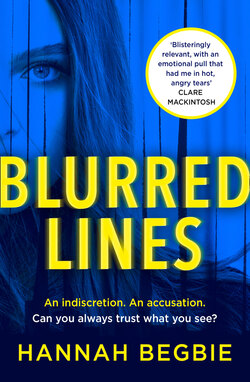Читать книгу Blurred Lines - Hannah Begbie - Страница 13
Chapter 7
ОглавлениеHounslow
Mid-September 2003 to mid-March 2004
In the weeks after the party Becky can wake in the mornings and for a few moments feel as if she has come to consciousness in her normal, untouched life. But then she remembers the badness, and it fills her heart and mind to the brim. She overflows with it.
It becomes a struggle just to get out of bed.
At first, she gets away with some mornings at home, complaining of a virus and, later, the flu. She insists she doesn’t need anything for it but her parents press paracetamol, tea and damp flannels in her direction. Weekends come and go but her usual trips to the pool are dropped and she can no longer countenance the bright and bouncy happiness of Saturday morning television presenters. She chooses to watch soaps instead, passively allowing their stories and characters to slide past her thoughts and feelings.
She hides her body in baggy clothes. She avoids the mirror, as if it might talk to her. She just wants to sleep.
After a fortnight of this her mum declares this period of supposed ill health as having gone on ‘far too long’. Becky is sent to a doctor who diagnoses glandular fever. This buys her another four months of staying in bed, watching television and avoiding food, until her mum begins to mistrust this diagnosis – having come from a generation that does not trust an illness with undefined edges and blurred duration and no brand-name pharmaceutical pill to cure it.
She insists on tests for Becky: blood and urine.
Becky goes to the GP surgery to get her results, alone. Just her and the doctor in his airless, disinfectant-scented, steel-and-chipped-Formica office. The words bend her reality. She thinks that she is losing her mind and that she is instead simply sitting in a maths lesson, studying a Venn diagram of symptoms for depression and pregnancy, looking where the circles bisect. Depression is the blue circle, pregnancy is the red circle, and there she is, all mixed up in the middle, as purple as a bruise.
Then, she cries a lot.
Time slips past her. The abortion clinic judges that she is well past twenty-four weeks pregnant. They offer to try to make an exception for her but they need to confer with their lawyers. She never goes back. She can’t talk to anyone.
In the end, Adam is the first person she tells about what is growing inside her. He hasn’t stopped coming round to her house, asking to see her, even though she always says no. Mary gave up weeks ago.
Adam holds her in his arms, asking nothing of her, simply being her friend.
Soon after, like it has been biding its time, waiting to be brought out into the open, the size and shape of Becky’s body betrays her and she becomes the example to be avoided, the beaming red sign for how wrong things can go.
People give her a wide berth in the school corridor, like she’s got a contagious illness.
Adam walks her to and from school and holds back her hair when she is sick on her shoes outside the school gates.
Sometimes he says that if she ever wants to talk, then he is there for her.
At home she eats very little and then goes straight to bed and watches television. It’s easy at first, when her dad isn’t talking to her and her mum is smoking a lot at the kitchen table. Becky just has to endure the times between when her dad makes tea and leaves the room, if she is in it, and the times he conveniently finishes eating as soon as she arrives at the table.
But it becomes less easy to shut herself away as her parents’ responses grow more vocal and persistent, like a cancer metastasizing. Her father, in particular, who has spent a lifetime calling pop stars and actresses in short skirts ‘harlots’ and ‘sluts’, becomes consumed with the idea of his daughter having underage sex as a leisure pursuit. He fills with rage and shouts things like: How could you be so irresponsible? Becky finds this response particularly unjust and excruciatingly painful, sinking further into a kind of listless, inward blame – the very worst form of rage. As if it wasn’t enough to watch her belly fill to the brim with her own shame, she has to add her father’s to the mix as well.
Then come the endless stream of questions – questions that sound more like accusations: Did it happen at home? In our home? How many of them have there been?
They receive a congratulations card from a neighbour and a helium balloon printed with the words: You’re going to be grandparents! Her father bursts it with the tip of a carving knife.
She stops going to school.
She can’t read. She just wants to watch those soaps on television, to be held in the soft bubble of other people’s mistakes, conflict and intrigues.
Her mum and dad stand in the doorway of her bedroom, faces pinched with anger. They ask her the same questions every day.
Who did this to you?
Who is its father?
